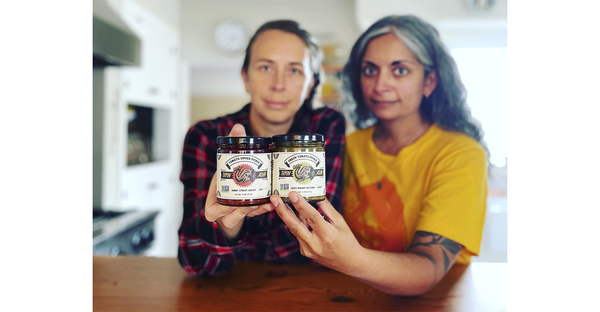The Non-GMO Project names first Equitable Transfer Program recipientThe Non-GMO Project names first Equitable Transfer Program recipient
Nonprofit's funding program supports members of underrepresented communities who seek Non-GMO Project verification for food, beverage or personal-care brands.
June 17, 2023

The Non-GMO Project announces that the recipient of its first round of Equitable Transfer Program grants is Tiffin Asha, a Portland, Oregon-based, women-owned and -operated maker of South Indian-inspired condiments founded by Sheila Bommakanti and Elizabeth Golay.
Launched in March, the Equitable Transfer Program was designed to address some of the barriers BIPOC-led companies face in accessing financial resources, industry infrastructure and visibility for their products. The program will provide funding to cover or offset the costs associated with achieving Non-GMO Project verification.
"Justice and diversity are essential to building a better food system," said Megan Westgate, executive director of the Non-GMO Project. "As a predominantly white-led organization, we are on a learning journey to understand the role we play in systemic racism and what we can do to transfer power and resources to people of color who own and lead businesses in the natural products industry.
"Our hope is that this equity program represents a small, but meaningful first step into even more meaningful relationships."

Elizabeth Golay and Sheila Bommakanti, founders of Tiffin Asha, received the Non-GMO Project's first Equitable Transfer Program grant.
For Tiffin Asha, the funds will go toward the cost of Non-GMO Project annual verification renewal. Besides Non-GMO Project Verified, the products are also vegetarian, vegan and gluten free. What started as a food cart is now a restaurant with a product line available nationwide.
"When we had our restaurant and food cart, it was easy to create an environment that showed customers we care about our ingredients. We were always there, and could literally talk with folks," Bommakanti said. "But as a specialty food company, we thought, 'How can we express this?' We thought about how we shopped, what we looked for in stores, and it did not take long for us to conclude that one of our first priorities would be to become a Non-GMO Project Verified brand."
"We are very proud to have our Tomato Ginger Pickle and Green Tomato Pickle Non-GMO Project Verified, because it shows our continued commitment to quality ingredients for our customers," Golay said.
Applications for the next round of funding for the Non-GMO Project Equitable Transfer Program will be accepted until July 31. Brands interested in becoming Non-GMO Project Verified can learn more on the website.
Source: Non-GMO Project Verified
Read more about:
J.E.D.I.You May Also Like



